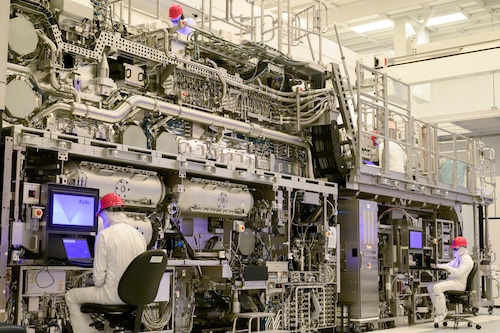The Commerce Department said early Tuesday that Intel and the Biden administration had reached an agreement on $7.9 billion in federal subsidies for the firm to construct, modernize, and expand operations in Oregon and three other states.
The entire package is $600 million less than the $8.5 billion that Intel and the Commerce Department agreed to when they revealed preliminary terms in March, even though Intel will get the first $1 billion from their award by the end of the year. Additionally, the government stated that Intel decided not to apply for the $11 billion in federal loans that were included in the March statement.
According to administration officials, they lowered the subsidies to reflect the effects of a different, $3 billion agreement that was made in September to have Intel provide chips for the Defense Department.
However, Intel’s declining prognosis is also reflected in the conditions of Tuesday’s agreement. As recently as last spring, Intel predicted a $100 billion factory buildout, but lackluster sales have forced the chipmaker to curtail the speed and scale of its spending.
This puts the Biden administration in the problematic political position of giving money to a business that is postponing building plans and laying off employees. Although Intel’s research facilities in Hillsboro would receive $1.9 billion as part of the purchase, it is uncertain how quickly and when the planned Oregon expansion will proceed.
This October, Intel laid off 15,000 employees nationwide, including 1,300 in Washington County. The chipmaker, which is trying to catch up to industry leader Taiwan Semiconductor Manufacturing Co., is cutting $10 billion from its 2025 budget and desperately needs the federal funds.
The 2022 CHIPS Act, a bipartisan piece of legislation, provided $52 billion to assist domestic semiconductor production, which is where Tuesday’s award comes from. Proponents argued that the United States needs to reduce its dependency on Asian technology and revitalize its semiconductor sector.
In a media briefing, Commerce Secretary Gina Raimondo stated that the industry is rebounding from a 30-year decline and that these facilities will significantly alter chip manufacturing and the strength of the U.S. chip industry while also creating tens of thousands of well-paying jobs for Americans.
The final outcome was praised by Intel CEO Pat Gelsinger, who grew more critical of the Biden administration over the eight months between the original announcement and Tuesday’s final award.
In a written statement, Gelsinger added that historic investments that are essential to the nation’s long-term economic growth and national security are being propelled by strong bipartisan support for regaining American manufacturing and technology leadership.
Donald Trump, the incoming president, has criticized the CHIPS Act despite having backed comparable programs in his first term. Both Intel and the departing administration had a deadline to complete their agreement or risk an unknown future with Trump, since Biden was scheduled to step down in January.
With one of the biggest crises in Intel’s five-decade history, Tuesday’s accord marks the largest amount granted under the CHIPS Act and a much-needed financial boost.
As businesses turn their attention to artificial intelligence, an area in which Intel has limited headway, the market for Intel microprocessors, which are used in PCs and data centers, has stagnated. Additionally, Intel has struggled to acquire customers for its fledgling contract manufacturing business since its production technology lags behind competitors.
Plans for plants in Germany, Poland, and Israel have been put on hold indefinitely by Intel.
In addition to a significant renovation of its facilities in additional Mexico, it is moving forward with the construction of two additional factories in Arizona and continues to develop two more in Ohio.
However, the Ohio factories will not open as scheduled for the upcoming year. While it waits for the anticipated resurgence in demand for its products, the firm is postponing building. The agreement reached on Tuesday commits Intel to opening one facility in Ohio by 2030, but it leaves open the prospect that the second factory may open much later if Intel’s sales aren’t strong enough to warrant the investment.
The announcement on Tuesday also outlines the renovation of Intel’s current Hillsboro plants, which are already the most cutting-edge in the firm. However, there is no indication that Intel intends to proceed with a significant expansion, including the addition of a fourth phase to its D1X research factory located close to Hillsboro Stadium.
A note asking for an update on Intel’s plans was not answered.
To increase its Hillsboro footprint, the business has a separate agreement with Oregon for $115 million in state incentives. Under that deal, Intel pledges to expand and add around 2,600 jobs by the beginning of 2029.
–Mike Rogoway writes on the business and technology in Oregon. You may contact him at 503-294-7699 or mrogoway@oregonian.com.
Your support is essential to our journalism. Please sign up for a subscription at OregonLive.com/subscribe right now.
Note: Every piece of content is rigorously reviewed by our team of experienced writers and editors to ensure its accuracy. Our writers use credible sources and adhere to strict fact-checking protocols to verify all claims and data before publication. If an error is identified, we promptly correct it and strive for transparency in all updates, feel free to reach out to us via email. We appreciate your trust and support!







